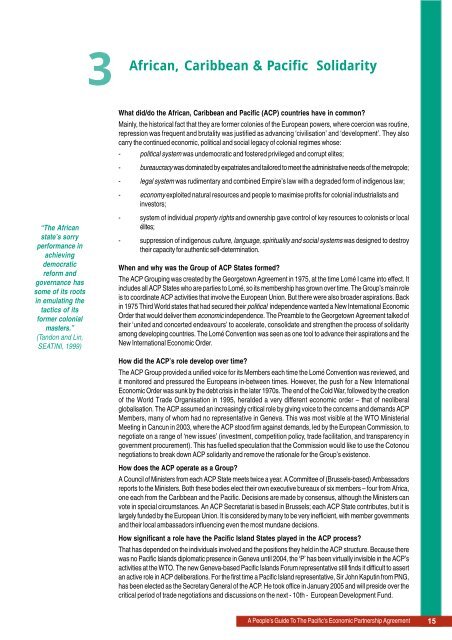REPA Booklet - Stop Epa
REPA Booklet - Stop Epa
REPA Booklet - Stop Epa
You also want an ePaper? Increase the reach of your titles
YUMPU automatically turns print PDFs into web optimized ePapers that Google loves.
3<br />
African, Caribbean & Pacific Solidarity<br />
What did/do the African, Caribbean and Pacific (ACP) countries have in common?<br />
Mainly, the historical fact that they are former colonies of the European powers, where coercion was routine,<br />
repression was frequent and brutality was justified as advancing ‘civilisation’ and ‘development’. They also<br />
carry the continued economic, political and social legacy of colonial regimes whose:<br />
- political system was undemocratic and fostered privileged and corrupt elites;<br />
- bureaucracy was dominated by expatriates and tailored to meet the administrative needs of the metropole;<br />
- legal system was rudimentary and combined Empire’s law with a degraded form of indigenous law;<br />
- economy exploited natural resources and people to maximise profits for colonial industrialists and<br />
investors;<br />
“The African<br />
state’s sorry<br />
performance in<br />
achieving<br />
democratic<br />
reform and<br />
governance has<br />
some of its roots<br />
in emulating the<br />
tactics of its<br />
former colonial<br />
masters.”<br />
(Tandon and Lin,<br />
SEATINI, 1999)<br />
- system of individual property rights and ownership gave control of key resources to colonists or local<br />
élites;<br />
- suppression of indigenous culture, language, spirituality and social systems was designed to destroy<br />
their capacity for authentic self-determination.<br />
When and why was the Group of ACP States formed?<br />
The ACP Grouping was created by the Georgetown Agreement in 1975, at the time Lomé I came into effect. It<br />
includes all ACP States who are parties to Lomé, so its membership has grown over time. The Group’s main role<br />
is to coordinate ACP activities that involve the European Union. But there were also broader aspirations. Back<br />
in 1975 Third World states that had secured their political independence wanted a New International Economic<br />
Order that would deliver them economic independence. The Preamble to the Georgetown Agreement talked of<br />
their ‘united and concerted endeavours’ to accelerate, consolidate and strengthen the process of solidarity<br />
among developing countries. The Lomé Convention was seen as one tool to advance their aspirations and the<br />
New International Economic Order.<br />
How did the ACP’s role develop over time?<br />
The ACP Group provided a unified voice for its Members each time the Lomé Convention was reviewed, and<br />
it monitored and pressured the Europeans in-between times. However, the push for a New International<br />
Economic Order was sunk by the debt crisis in the later 1970s. The end of the Cold War, followed by the creation<br />
of the World Trade Organisation in 1995, heralded a very different economic order – that of neoliberal<br />
globalisation. The ACP assumed an increasingly critical role by giving voice to the concerns and demands ACP<br />
Members, many of whom had no representative in Geneva. This was most visible at the WTO Ministerial<br />
Meeting in Cancun in 2003, where the ACP stood firm against demands, led by the European Commission, to<br />
negotiate on a range of ‘new issues’ (investment, competition policy, trade facilitation, and transparency in<br />
government procurement). This has fuelled speculation that the Commission would like to use the Cotonou<br />
negotiations to break down ACP solidarity and remove the rationale for the Group’s existence.<br />
How does the ACP operate as a Group?<br />
A Council of Ministers from each ACP State meets twice a year. A Committee of (Brussels-based) Ambassadors<br />
reports to the Ministers. Both these bodies elect their own executive bureaux of six members – four from Africa,<br />
one each from the Caribbean and the Pacific. Decisions are made by consensus, although the Ministers can<br />
vote in special circumstances. An ACP Secretariat is based in Brussels; each ACP State contributes, but it is<br />
largely funded by the European Union. It is considered by many to be very inefficient, with member governments<br />
and their local ambassadors influencing even the most mundane decisions.<br />
How significant a role have the Pacific Island States played in the ACP process?<br />
That has depended on the individuals involved and the positions they held in the ACP structure. Because there<br />
was no Pacific Islands diplomatic presence in Geneva until 2004, the ‘P’ has been virtually invisible in the ACP’s<br />
activities at the WTO. The new Geneva-based Pacific Islands Forum representative still finds it difficult to assert<br />
an active role in ACP deliberations. For the first time a Pacific Island representative, Sir John Kaputin from PNG,<br />
has been elected as the Secretary General of the ACP. He took office in January 2005 and will preside over the<br />
critical period of trade negotiations and discussions on the next - 10th - European Development Fund.<br />
A People’s Guide To The Pacific’s Economic Partnership Agreement 15
















